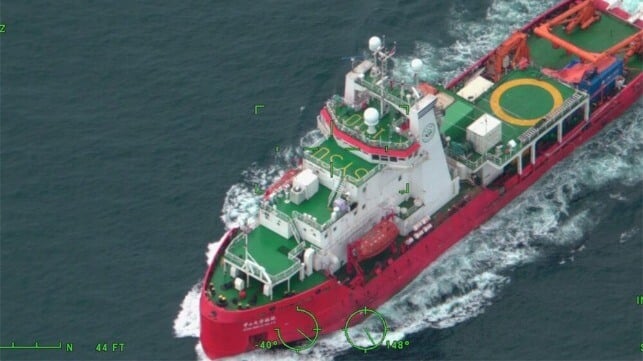U.S. Coast Guard Tracks More Chinese Research Vessel Activity in the Arctic

For the second time in weeks, the U.S. Coast Guard reports it is tracking Chinese research vessels operating in the Arctic. The U.S. says that the presence of these vessels is consistent with a three-year trend of increased activity from Chinese vessels operating in the Arctic.
On August 5, the Coast Guard reports its C-130J Hercules fixed-wing aircraft operating from Air Station Kodiak identified and tracked the Chinese research vessels Ji Di and the Zhong Shan Da Xue Ji Di. Both vessels were transiting northeast in the Bering Sea.
The following day, August 6, it says, the crew of U.S. Coast Guard Cutter Waesche again located the Zhong Shan Da Xue Ji Di as it was transiting north in the Chukchi Sea above the Arctic Circle, after passing through the Bering Strait.
These two sightings followed the July 26 report that the Coast Guard Arctic District deployed a C-130J Hercules fixed-wing aircraft from Air Station Kodiak to track the Xue Long 2, another Chinese research vessel. It was spotted approximately 290 nautical miles north of Utqiagvik, Alaska.
This year, the U.S. Coast Guard reports it is currently monitoring a total of five Chinese research vessels in or near the U.S Arctic. By comparison, the Coast Guard says that last year, three Chinese research vessels conducted research operations north of the Bering Strait.
The Coast Guard Arctic District works in conjunction with international partners, U.S. Northern Command, and Alaskan Command to constantly monitor the activity of foreign vessels operating near U.S. sovereign waters and the extended outer continental shelf. The C-130 and cutter Waesche were patrolling under Operation Frontier Sentinel, which monitors and responds to vessels operating in and around Alaskan and U.S. Arctic waters. The U.S. Coast Guard says its responses are intended to counter malign activities, defend sovereign interests, and promote maritime conduct consistent with international law and norms.

that matters most
Get the latest maritime news delivered to your inbox daily.
China responded angrily at the end of July to the previous interaction with the U.S. Coast Guard, calling the U.S. a “rule-breaker” and “global troublemaker.” It said the U.S. was arbitrarily extending its boundaries in the Arctic and that its vessels were in international waters. The Chinese said that in addition to the U.S., nations including Canada, Denmark, Norway, and Russia have all made sovereign claims over sections of the Arctic seabed, motivated by the region’s vast resources.
